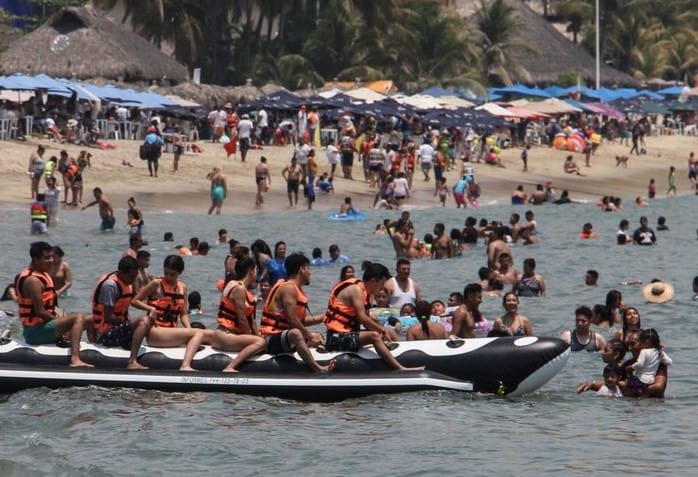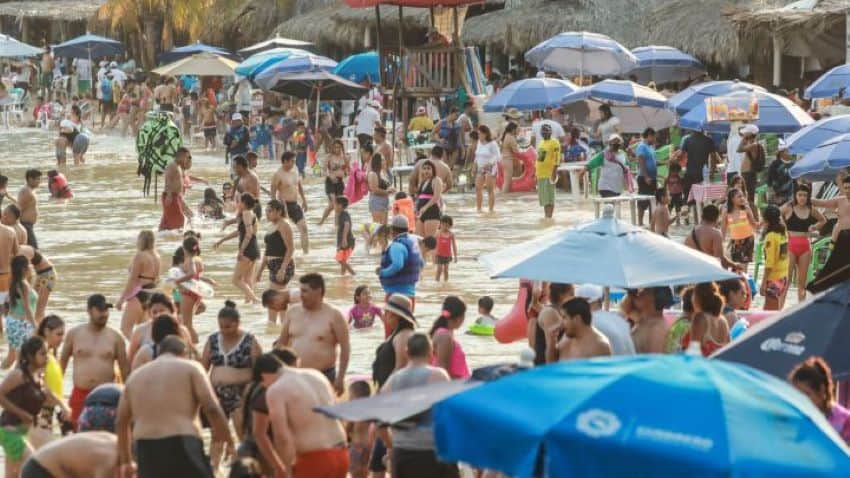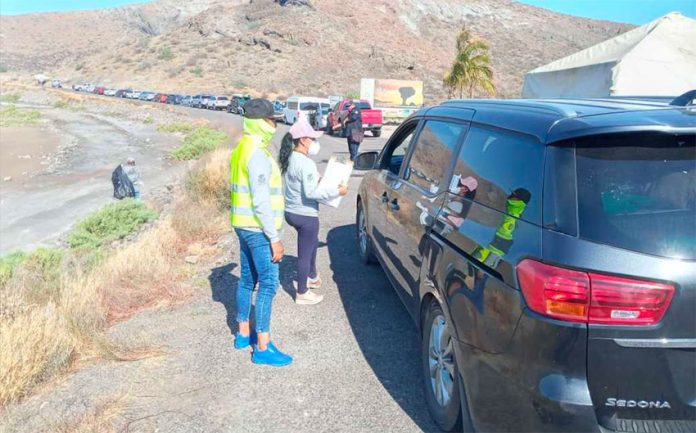The pandemic didn’t stop hordes of tourists from flocking to some of Mexico’s most popular beach destinations over the weekend, raising concerns that the Easter vacation period could fuel a third wave of new coronavirus infections.
Cancún, Acapulco, Puerto Escondido and Huatulco were among the destinations that saw large numbers of vacationers, many of whom failed to follow basic virus mitigation rules such as wearing a face mask and keeping a safe distance from others.
In Cancún, where hotel occupancy exceeded 65% during the Holy Week holiday period and more than 240 flights touched down on Saturday alone, both Mexican and foreign tourists packed the Caribbean coast beaches to soak up the sun, swim or wade in the water and perhaps forget about the pandemic for a while.
One especially popular beach was Playa Gaviota Azul, where the resistance to complying with coronavirus mitigation measures was palpable, according to a report by the newspaper El Universal.
Alcohol on sale at a kiosk at the entrance to the beach may have been a factor in some people’s carefree attitude, while pandemic fatigue and the outdoor environment also likely contributed to beachgoers’ reluctance to mask up and follow other health recommendations.

Hotels in Acapulco, Guerrero’s premier resort city, and the Oaxaca coastal destinations of Puerto Escondido and Huatulco were also busy, although occupancy levels weren’t quite as high as those in Cancún.
A party atmosphere prevailed in Puerto Escondido, especially on and around Playa Zicatela, the resort town’s famous surfing beach. Young revelers packed bars and other venues that line the beachfront to drink, shout and dance, El Universal said.
“All this without social distancing or face masks as if they were immersed in a world where Covid-19 doesn’t exist,” the newspaper said.
Most visitors to the 10 beaches across Puerto Escondido’s two municipalities also failed to follow basic health rules, and authorities in most cases did nothing to enforce them, a shift in attitude compared to last October when more than 200 people were arrested in a span of just five days for not wearing face masks in public.
So-called health modules, where people have their temperature checked and are given hand sanitizer, were only in operation at a couple of beaches over the weekend, one of which was Playa Carrizalillo. El Universal also reported that a maximum of 300 people — 60% of normal capacity — were permitted onto the beach. But despite authorities’ efforts to reduce the risks, beachgoers appeared to forget about the virus threat once they were on the sand.
Authorities didn’t attempt to limit capacity at most other beaches in Puerto Escondido, where the majority of the tourists were domestic rather than international travelers.

Another state where beaches were busy over the holiday period was Baja California Sur, home to destinations such as Los Cabos, Loreto and La Paz. However, authorities there limited capacity to 50% of normal levels to reduce coronavirus risks.
State Civil Protection official Carlos Alfredo Godínez León said that a lot of Baja California Sur residents couldn’t resist going to the beach over the weekend because of the good weather.
“They allowed themselves to go to the different beaches in the state, but as was expected, not all managed to enter,” he said, noting that the capacity control measures enforced by all three levels of government were effective.
Some families were “annoyed” at being denied beach access, Godínez said, adding that “it was worse for those who lined up for a long time and were told there was no space [on the beach] when they got to the checkpoint.”
In the lead-up to Easter, health authorities urged people to continue following virus mitigation measures and not gather in large numbers over the holiday period. They also warned that Mexico is not immune from the possibility of a third wave of the coronavirus, as has occurred or is occurring in many countries around the world.
But more than a year after the virus was first detected in Mexico, and with the second wave — which peaked in January — having receded, many Mexicans are no longer as worried about becoming ill with Covid-19.

“Covid can get screwed! [The pandemic] hasn’t come to an end, but neither have we, so let’s have fun,” a group of young vacationers from Mexico City said in late March as they strolled down 5th Avenue, Playa del Carmen’s main tourist strip, while passing around a bottle of tequila.
Many foreign tourists in Mexico — among which are large numbers of United States citizens who may have already been vaccinated against Covid — also appear unconcerned about the ongoing virus risk, with many largely eschewing face masks during visits to popular destinations such as Cancún and Tulum.
Only time will tell if the nonchalance will fuel new large outbreaks in tourism-dependent states such as Quintana Roo, which saw case numbers spike after the Christmas-New Year vacation period.
According to Guadalupe Soto Estrada, a public health academic at the National Autonomous University, there is a risk that the pandemic in Mexico will worsen as a result of the relaxation of virus mitigation measures over the Easter break.
“Everyone wants to come out of lockdown but … the epidemic is still active, and we must continue looking after ourselves,” she told the news website Animal Político.
Although Mexico’s vaccination program has been underway for more than three months and has recently gathered pace, Soto asserted that virus mitigation measures must still be observed.
“The health measures can’t be relaxed during all of 2021 at least,” she said.
Source: El Universal (sp), AS (sp), Milenio (sp)
